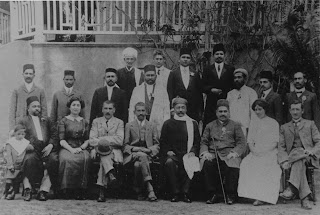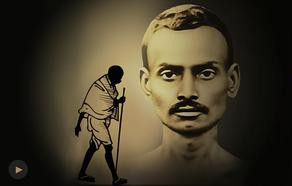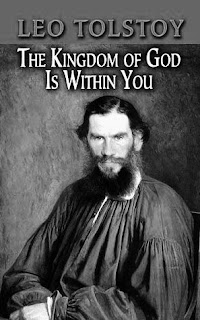Gandhi wrote in his autobiography 'The Story Of My Experiments With Truth' that he credited three moderns who left a deep impression on his life. They include Raychandbhai, whom he calls his spiritual refuge, Tolstoy’s book: ‘The Kingdom of God is Within You’ and Ruskin’s book ‘Unto this Last’.
Gopal Krishna Gokhale was also the mentor and guru to Mohandas K Gandhi. Gandhi considered him a guide, and once called him a "Mahatma".
List of Gandhi Ji's mentors
- Shrimad Rajchandra
- John Ruskin
- Leo Tolstoy
- Gopal Krishna Gokhale
Gandhi and Shrimad Rajchandra
"I was but a briefless barrister then, and yet whenever I saw him he would engage me in conversation of a seriously religious nature. Though I was then groping and could not be said to have any serious interest in religious discussion, still I found his talk of absorbing interest. I have since met many religious leaders or teachers. I have tried to meet the heads of various faiths, and I must say that no one else has ever made the impression on me that Raychandbhai did. His words went straight home to me. In my moments of spiritual crisis, as in South Africa, he was my refuge. Though I could not place Raychandbhai on the throne of my heart as Guru, he was, on many occasions, my guide and helper,” Gandhi describes in his autobiography.
When and where did Gandhi meet his spiritual mentor Raychandbhai?
July 6, 1891, was an important day in the Indian national movement. It was the day when the conscience keeper, or the Mahatma of Bharat, first met his spiritual mentor. Faced with a phase of ‘spiritual crisis’, and in a state of dilemma, Mahatma Gandhi met Shrimad Rajchandra on this day. The Father of the Nation called him Raychandbhai. Gandhi met Raychandbhai immediately on his return from London to Bharat at Bombay.
How was Gandhi influenced by Raychandbhai?
Gandhi admired Raychandbhai for his renunciation. Raychandbhai taught Gandhi that it was the only way a man could live. Raychandbhai, who was a follower of Jainism, helped Gandhi to restore his faith in Hinduism, and to seek answers to the questions that he had been struggling with since his childhood.
After his face to face meeting, Gandhi also sent his ‘spiritual mentor’ questions, and he mentions "all the answers arrived promptly in a letter which helped me resolve my doubts, and restore my faith in Hinduism."
“He was also known as a Shatavadhani (one having the faculty of remembering or attending to a hundred things simultaneously)... I exhausted my vocabulary of all the European tongues I knew and asked the poet to repeat the words. He did so in the precise order in which I had given them. I envied his gift without, however, coming under its spell. The thing that did cast its spell over me I came to know afterwards. This was his wide knowledge of the scriptures, his spotless character, and his burning passion for self-realisation. I saw later that this last was the only thing for which he lived,” writes Gandhi.
“He was also known as a Shatavadhani (one having the faculty of remembering or attending to a hundred things simultaneously)... I exhausted my vocabulary of all the European tongues I knew and asked the poet to repeat the words. He did so in the precise order in which I had given them. I envied his gift without, however, coming under its spell. The thing that did cast its spell over me I came to know afterwards. This was his wide knowledge of the scriptures, his spotless character, and his burning passion for self-realisation. I saw later that this last was the only thing for which he lived,” writes Gandhi.
Above all Raychandbhai's impression as a spiritual guide on Gandhi's mind was unrivaled.
Gandhi & John Ruskin
How did Ruskin's 'Unto This Last' inspire Gandhi?
Gandhi described Ruskin's book, "Unto This Last" as "the magic spell". Gandhi was offered Ruskin's book by Gandhi's intimate friend Mr Polak and Gandhi read it on his train journey from Johannesburg to Durban in June 1904. The book gripped Gandhi so much that its teachings appealed to him instantaneously and he paraphrased it into Gujarati as "Sarvodaya" (Welfare of all). Gandhi learnt the teachings of Unto This Last to be:
- The good of the individual is contained in the welfare of all.
- All have the same right of earning their livelihood from their work. That is, a lawyer's work has the same value as the barber's,
- That life of labour, that is, the life of the tiller of the soil and the handicraftsman, is the life worth living.
More than influencing his own life, Gandhi dreamt of Ruskin's thoughts influencing soon-to-be-independent Bharat. In July 1946, Vaikunthlal Mehta, finance and village industries minister of Bombay state organised a conference of state industries ministers in Pune. Addressing them, Gandhi once again fondly recalled the magical spell of "Unto This Last", and told the people who were going to chart the industrial future of a free Bharat soon:
"I saw clearly that if mankind was to progress and to realise the ideal of equality and brotherhood, it must adopt and act on the principle of Unto This Last; it must take along with it even the dumb and the lame... That is not my picture of independence in which there is no room for the weakest. That requires that we must utilise all available human labour before we entertain the idea of employing mechanical power.”
"I saw clearly that if mankind was to progress and to realise the ideal of equality and brotherhood, it must adopt and act on the principle of Unto This Last; it must take along with it even the dumb and the lame... That is not my picture of independence in which there is no room for the weakest. That requires that we must utilise all available human labour before we entertain the idea of employing mechanical power.”
Gandhi & Leo Tolstoy
By the time Gandhi came to know Tolstoy, which was in 1894, he was just an unknown lawyer finding his way in South Africa. While Tolstoy, who was forty-one years senior to Gandhi in age, had already reached the zenith of his fame. Their correspondence started only in 1909, a year before Tolstoy’s death. They exchanged 7 letters in all, 4 from Gandhi and 3 from Tolstoy. Tolstoy came to know Gandhi only through Hind Swaraj (1909).
Impact of Tolstoy's 'The Kingdom of God is Within You' on Gandhi
Gandhi read Tolstoy's book in 1894, the year of the first English translated edition. As Gandhi states in his Autobiography, the book overwhelmed him. It was required reading for members of the Phoenix Settlement and Tolstoy Farm. It was his constant companion during his South African days and all three of his prison stays in South Africa.
Gandhi was deeply moved by Tolstoy's concept of truth, which, in his view, constitutes any doctrine that reduces suffering. Tolstoy manifested independent thinking, profound morality and truthfulness.
Gandhi & Gokhale
Gokhale's impact on the national struggle for independence is immense, and it was he who prevailed upon Gandhi to return to India from South Africa.
When did Gandhi meet his Political Guru Gopal Krishna Ghokhale?
Gandhi met Gokhale in 1896 but eventually managed to return to India in 1915, the same year that Gokhale died. But his earlier meetings in 1901 and 1912 had a great and lasting influence on Gandhi.
 |
| Gandhi with Gokhale |
How much did Gandhi respect Gokhale?
Gandhi boarded the ship ‘Arabia’ on December 19, 1914. He had started wearing Dhoti and Turban during his stay in England. He wrote to (Hermann) Kallenbach in January 1915, “Today, I have worn the Indian dress. The passengers looked surprised”. On January 9, 1915, Gandhi disembarked at Apollo Bunder, Bombay, at 7.30 am. Gokhale had come from Pune to welcome Gandhi back to Bharat.
How did Gokhale's advice guide Gandhi?
Gokhale's advice to Gandhi was to tour the length and breadth of the country, "with eyes and ears open, but mouth shut"; absorbing, learning, digesting, but not reacting. Gokhale also funded this one-year trip around India so that Gandhi could discover the country.
Conclusion: Hero of Gandhi
In his first meeting, Gandhi was convinced that Shrimad Raychand was a man of great character and learning. While the Tolstoy’s Kingdom of God made Gandhi realise the infinite possibilities of universal love, cured him of his skepticism and sowed the seed of an invincible belief in non-violence, Ruskin’s Unto This Last brought about an instantaneous and practical transformation in his life.
In a letter to Premabehn Kantak, a teacher in the Sabarmati Ashram, in 1931, Gandhi wrote: " 'Hero' means one worthy of reverence, a god, so to say. ... The persons who have influenced my life as a whole in a general way are Tolstoy, Ruskin and Thoreau and Raychandbhai. Perhaps I should drop Thoreau from this list.”
In a letter to Premabehn Kantak, a teacher in the Sabarmati Ashram, in 1931, Gandhi wrote: " 'Hero' means one worthy of reverence, a god, so to say. ... The persons who have influenced my life as a whole in a general way are Tolstoy, Ruskin and Thoreau and Raychandbhai. Perhaps I should drop Thoreau from this list.”



Comments
Post a Comment